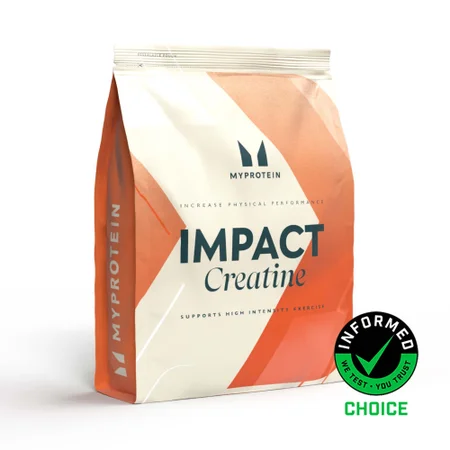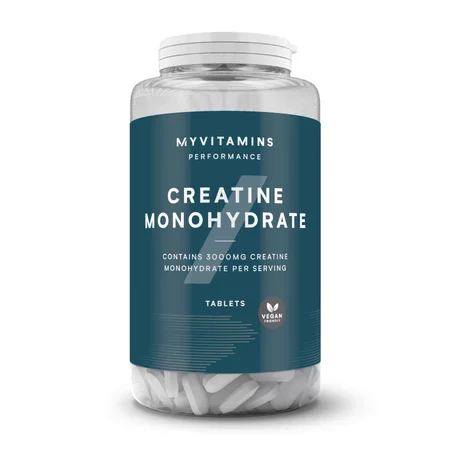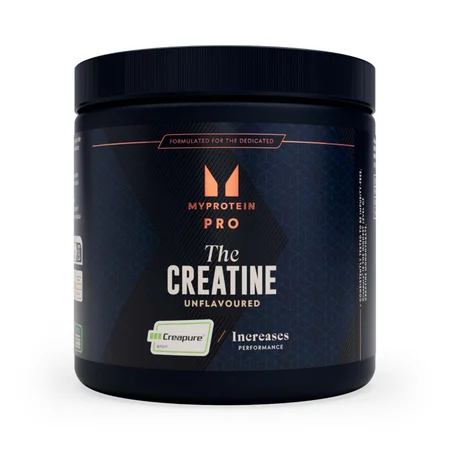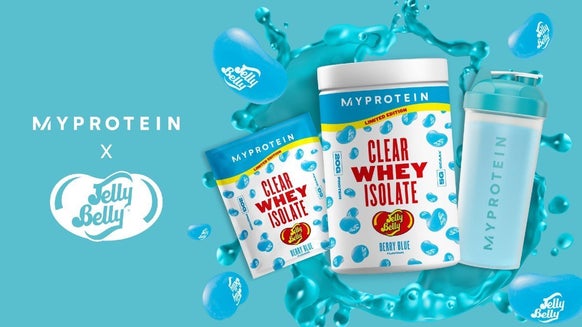
Creatine is widely considered to be one of the most effective supplements available.1 It’s also been heavily researched and its far reaching benefits have been scientifically proven in multiple studies. But, what is creatine, and how can it help you reach your fitness goals?
If you’re looking to pack on muscle mass, hit new PBs on your big lifts, sprint quicker, recover better or even improve short term memory, creatine supplementation is worth some serious consideration.
In this article, you'll find:
What is creatine?
How does creatine work?
Who is creatine for?
Creatine benefits and effects
How to take creatine supplements
What is creatine?
Creatine is a naturally occurring compound with a similar structure to an amino acid. It’s found in foods such as beef, pork and fish and is produced by the body in the liver, kidneys and pancreas.
Around 95% of your body’s creatine is stored in skeletal muscle.2 An average 70kg male will store around 120g, but by supplementing with creatine, it’s possible to store approximately 160g.3
The body breaks down 1-2% of your muscle creatine stores every day.4 In order to replace this broken down creatine, the body either produces it from amino acids or gets it from dietary sources such as meat and fish.
Large amounts of meat and fish are needed to get a meaningful amount of creatine. For example, 450g of uncooked beef provides 1g of creatine.3 Supplementing creatine is therefore an inexpensive and efficient way of increasing your body’s availability of creatine.
How does creatine work?
In your body, creatine combines with the chemical compound phoshagen to form phosphocreatine (PCr). During explosive exercise, such as a heavy set of squats or a 60m sprint, the body uses creatine to make ATP for energy.
Your ability to perform at a high intensity is reliant on your muscles having a supply of ATP. PCr helps your body generate this vitally important ATP, enabling you to perform at the required intensity for longer.
During explosive movements, such as weight training or sprinting, your body also uses PCr as fuel. By boosting your body’s available PCr stores it will mean you can hit those all-important extra reps.
By supplementing with creatine, this increased quality of work over a long period of time will lead to greater training adaptations such as increased muscle mass, greater strength and faster sprint times.1
Who is creatine for?
Creatine will help anyone looking to build muscle mass and increase their strength.1. Due to the positive effect that creatine can have on repeated bouts of high intensity exercise, creatine can also help in a number of different sporting scenarios.5 There is extensive evidence to show a performance benefit across a wide range of sports, particularly those requiring explosive, powerful movements and a quick recovery time from repeated sprints.5
Anyone who’s been training strength for a long time will know how frustrating getting caught in a plateau can be. There’s nothing worse than putting in the work and the numbers not moving. For example, if your squat or bench is stuck, incorporating creatine supplementation could give you that extra edge to smash through a sticking point.
As creatine is found in meat and fish, vegetarians may see a greater benefit in creatine supplementation as their storage levels will be lower.6
Creatine benefits and effects
When combined with resistance training, creatine supplementation has been repeatedly shown to be a very effective way to increase muscle mass.1 The evidence suggests that those supplementing creatine can gain nearly twice as much muscle mass as those who don’t.7
Whilst the exact mechanisms for the increase in muscle mass are unclear, the evidence suggests that the gains in muscle mass may be due to an increased capacity to perform a larger amount of high quality training.7
Essentially, the increased creatine storage can enable you to push out extra reps and improve recovery between sets. In time, this will amount to more muscle gain.
Creatine also has osmotic properties, meaning creatine will draw water into the muscle cell causing it to swell. It has been suggested that this swelling acts as a signal that will trigger muscle protein synthesis, the process in which your body builds muscle8.
For those looking to build chest, shoulder, and arm muscles, recent evidence has shown that creatine can be particularly beneficial for muscular hypertrophy. In a study comparing muscle mass gains in response to resistance exercise, it was shown that supplementing creatine built more muscle in the upper body than in the lower body.9
It was proposed that this was due to the muscle fibre type composition. Specifically, upper body muscles that contain more type 2 muscle fibres (the kind used in fast, powerful movements such as weightlifting) and that those fibres are more susceptible to creatine supplementation due to a greater uptake in creatine.
The effects of creatine on muscle mass are also more pronounced in vegetarians. A study looking at the effects of a resistance training program combined with creatine supplementation showed that over the course of 8 weeks, vegetarians gained on average 2.4g of lean body mass compared to 1.9kg in meat eaters.10
The benefits of creatine supplementation on strength performance have been well documented.1 In both short-term and long-term studies, strength performance has been reported to raise performance by 5% to 15%.7
An increased strength performance, combined with increased muscle mass in the upper body, may mean that creatine could be the perfect supplement for anyone looking to hit a new bench press PB. Studies looking specifically into the effect of creatine on 1RM bench press performance have shown an increase between 3% and 45%.11
Creatine can also help improve strength across a number of other common gym exercises such as the squat, leg press, leg curl, leg extension and shoulder press. A 10-week study looking into the performance of each of these showed creatine supplementation improved strength performance in every one. This was attributed to an improved work capacity and an increased resistance to the effects of overtraining.12
Creatine has also been shown to be particularly beneficial to the sport of weightlifting. A review paper looking into the effects of creatine supplementation on strength and weightlifting performance showed that those supplementing creatine combined with resistance training increased performance by 26%. In those without the creatine, performance was only improved by 12%. This 14% difference can make a big difference when looking to place on the podium on competition day.11
Creatine can help your body to replenish its glycogen stores. During a resistance training, your muscle’s glycogen stores can be depleted by as much as 40%, depending on the duration and intensity of your session.12 The ability to restore glycogen is an important as aspect of recovery as it will allow return to training or exercising at the same high intensity sooner. 13
Creatine could also play a role in providing energy in the brain. There’s evidence to show that in complex mental tasks, where your brain requires a lot of energy, creatine supplementation can improve performance 15.
For example, in a number recall task, those who supplemented with creatine performed better. However, this effect was not shown in the less complicated recall task suggesting the more energy the brain needs, the more effective creatine can be.15
As with skeletal muscle, vegetarians may see greater improvements in cognitive function due to the lack of creatine in their diet.16
How to take creatine supplements
A good time to take creatine would be after your workout as anabolic hormones (muscle building hormones) such as insulin are elevated.17 Research has also shown that ingesting creatine with protein and carbohydrates may be the best way to get creatine into muscle cells.17
Combining these three in a post-workout shake can be a great strategy to optimise recovery and training adaptations.
The fastest way to increase creatine stores is via a loading phase. An example of this would be 5g creatine monohydrate, four times a day for 5-7 days. The faster you raise your creatine levels, the quicker you will see a performance and exercise capacity benefit. However, it’s also possible to saturate your creatine stores with a lower maintenance dose such as 3g a day for 28 days.19
Once creatine stores are fully saturated, a maintenance dose of 3-5g a day will be sufficient to maintain full stores.1 For larger athletes however, this may need to be 5-10g.1
The only reported side effect of creatine is weight gain. Numerous long term studies have shown no adverse health risks following daily creatine ingestion.1
Take Home Message
Creatine can help with pretty much every goal you may have in the weight room. From increasing strength across a wide range of exercises to boosting recovery.
Creatine can also help with any sport that requires explosive movements and fast recovery between repeated sprints.
Vegetarians may see the biggest benefits as they have will have lower levels of creatine stored due an absence of meat and fish in the diet.
With very few side effects, creatine can be the perfect supplement if you are looking to maximise muscle, strength and performance gains cheaply and effectively.

Liam is a certified sport nutritionist with the International Society of Sport Nutrition and is enrolled on the British Dietetics Association’s Sport and Exercise Nutrition register. He has a Bachelor’s of Science in Sport and Exercise Science and is graduate of the ISSN Diploma in Applied Sport and Exercise Nutrition.
Liam is an experienced personal trainer, helping clients reach their health and fitness goals with practical, evidence informed exercise and nutrition advice. In his spare time Liam has competed in numerous powerlifting competitions and enjoys hill walking, football and expanding his recipe repertoire in the kitchen.Find out more about Liam's experience here.
- Kreider RB, Kalman DS, Antonio J, Ziedenfuss TN, Wildman R, Collins R…. Lopez H. (2017). International Society of Sports Nutrition position stand: safety and efficacy of creatine supplementation in exercise, sport, and medicine. Journal of the International Society of Sports Nutrition. 14:18
- Balsom PD, Soderlund K, Ekblom B (1994). Creatine in humans with special reference to creatine supplementation. Sports Med. 1994, 18: 268-80.
- Hultman E, Soderlund K, Timmons JA, Cederblad G, Greenhaff PL. (1996). Muscle creatine loading in men. J Appl PhysioI 1996;81:232- 237
- Brunzel NA: Renal function: Nonprotein nitrogen compounds, function tests, and renal disease. Clinical Chemistry. Edited by: Scardiglia J, Brown M, McCullough K, Davis K. 2003, McGraw-Hill: New York, NY, 373-399.
- Cooper R, Naclerio F, Allgrove J, Jimenez. (2012). Creatine supplementation with specific view to exercise/sports performance: an update. Journal of the International Society of Sports Nutrition 9:33
- Burke DG, Chillibeck PD, Parise G, Candow DG, Mahoney D, Tarnopolsky M. (2003). Effect of creatine and weight training on muscle creatine and performance in vegetarians. Med Sci Sports Exerc. 2003;35(11):1946–55.
- Buford TW, Kreider RB, Stout JR, Greenwood M, Campbell B, Spano M… Antonio J (2007). International Society of Sports Nutrition position stand: creatine supplementation and exercise. Journal of the International Society of Sports Nutrition. 4:6.
- Kreider RB. (2003. Effects of creatine supplementation on performance and training adaptations. Mol Cell Biochem. 2003;244(1–2):89–94.
- Nunes JP, Ribeiro AS, Schoenfeld BJ, Tomeleri CM, Avelar A, Trindade MC, Nabucco HC..Cyrino ES. (2017). Creatine supplementation elicits greater muscle hypertrophy in upper than lower limbs and trunk in resistance-trained men. Nutr Health. Dec;23(4):223-229
- Burke DG, Candow DG, Chilibeck PD, MacNeil LG, Roy BD, Tarnopolsky MA, Ziegenfuss T: Effect of creatine supplementation and resistance-exercise training on muscle insulin-like growth factor in young adults. Int J Sport Nutr Exerc Metab 2008, 18:389–398.
- Rawson ES, Volek JS. (2003). Effects of creatine supplementation and resistance training on muscle strength and weightlifting performance. J Strength Cond Res. Nov;17(4):822-31
- Vandenberghe M, Goris P, Van Hecke M Van Leemputte L, Hespel P. (1997). Long term creatine intake is beneficial to muscle performance during resistance training. J Appl Physiol. Dec;83(6):2055-63.
- MacDougall JD, Ray S, Sale DG, McCartney N, Lee P, Gamer S. (1999) Muscle substrate utilization and lactate production during weightlifting. Can J Appl Physiol 1999; 24(3):209-215.
- Haff GG, Whitley Low·carbohydrate diets and high-intensity anaerobic exercise. Strength and Cond 2002;24(4):42-53
- McMorris, T., Mielcarz, G., Harris, R.C., Swain, J.P., Howard, A., (2007a). Creatine sup- plementation and cognitive performance in elderly individuals. Aging Neuropsychol. Cogn. 14 (5), 517–528.
- Benton, D., Donohoe, R., 2011. The influence of creatine supplementation on the cognitive functioning of vegetarians and omnivores. Br J Nutr 105 (7), 1100–1105
- Borsheim E, Aarsland A, Wolfe RR. (2004). Effect of an amino acid, protein, and carbohy- drate mixture on nct musclc protein balance after resistance exercise. Int J Sport Nutr Exerc Metab 2004;14:255-271.
- Hultman E, Soderlund K, Timmons JA, Cederblad G, Greenhaff PL. (1996). Muscle creatine loading in men. J Appl PhysioI 1996;81:232- 237.
- Williams MH, Kreider R, Branch JD. Creatine: the power supplement. Champaign, IL: Human Kinetics Publishers; 1999.






